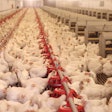Some of you may recognize me from my work on another industry publication, though it’s likely most of you don’t know me at all, but I’m happy to report that I have taken the reins as the editor of WATT’s feed brands. I am honored to serve you and hope that during my tenure I am able to supply valuable information to aid in supporting your business by delivering leading-edge coverage of the feed industry. Please do not hesitate to contact me directly with any ideas or suggestions. I rely heavily on reader feedback to drive the focus of my editorial content.
Now that we have introductions out of the way, let’s start this column by journeying into the lion’s den of genetically modified grain.
Aside from the discovery of genetically modified wheat “contaminating” an Oregon field, which lead to the postponement of wheat exports to Asia (the USDA has since ruled this an isolate incident), and Connecticut’s move toward enforcing the labeling of genetically engineered foods, the big news of the week focused around a study published in the Journal of Organic Systems, an Australian research publication that is in part supported by a pro-organics group. The report concludes that genetically engineered grains have a negative effect on pigs—specifically by way of severe stomach inflammation. Those who believe the study to be valid hope to make a correlation between genetically modified grains and digestive problems in humans and push for long-term, in-depth research to determine health, safety risks.
Naturally, ag industry advocates came forward, guns blazing, to question the study’s methodology; naysayers have taken this information and ran with it, using it to support the push for the mandatory labeling of genetically modified ingredients on food stuffs.
So let’s get the conversation started: What do you think? Share your thoughts and/or experiences with me online via Twitter @jackieroembke, #GMfeed, or via email, [email protected].
Follow me on Google+













